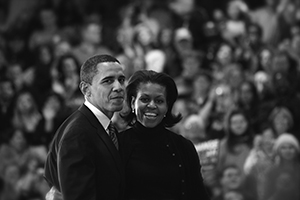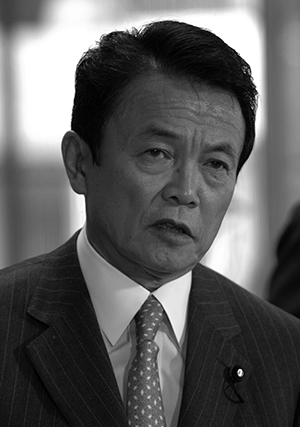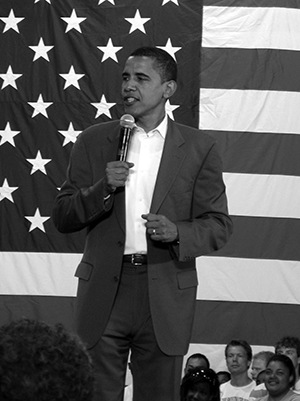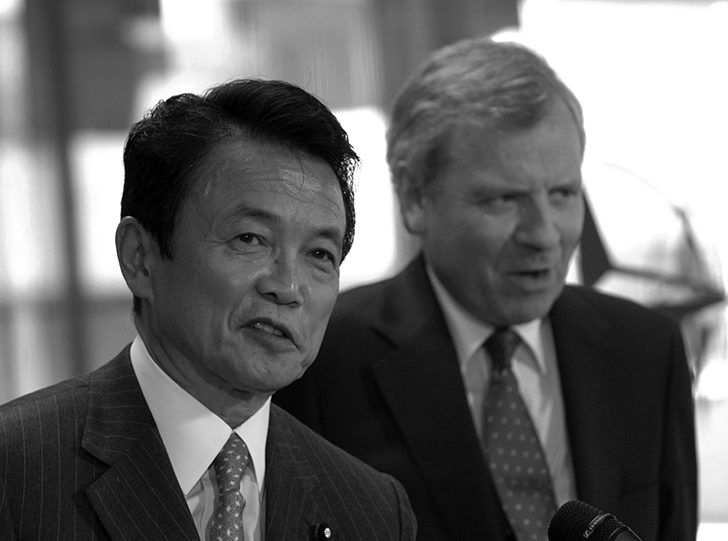 History has been made. After months of bitter campaigning the world finally knows that it will be Barack Obama, not John McCain, who will be sworn in as the 44th president of the United States of America on January 20th. But when the election dust finally settles and Senator Obama becomes President Obama he will have a hefty inheritance to deal with: the worst economic crisis since the Great Depression and foreign policy challenges that include wars in Afghanistan and Iraq, the nuclear threat of North Korea and Iran, and the rise of China, being just a part of that which will lie before him.
History has been made. After months of bitter campaigning the world finally knows that it will be Barack Obama, not John McCain, who will be sworn in as the 44th president of the United States of America on January 20th. But when the election dust finally settles and Senator Obama becomes President Obama he will have a hefty inheritance to deal with: the worst economic crisis since the Great Depression and foreign policy challenges that include wars in Afghanistan and Iraq, the nuclear threat of North Korea and Iran, and the rise of China, being just a part of that which will lie before him.
To face up to many of these issues Obama will need to work closely with Japan and current prime minister Taro Aso. But what shape will Japan-US relations take after January 20th and what challenges lay ahead for the Aso-Obama era?
Prime Minister Aso was quick to engage the president-elect after John McCain had conceded defeat, releasing a statement the day after the democratic senator’s landslide victory in which he expressed his “heartfelt congratulations to Senator Obama on his election as president.” In his statement Aso gave us a first glimpse of the priority issues for the Aso-Obama era, by adding that he would “strive to strengthen the Japan-US alliance and to resolve various challenges the international community faces when addressing issues such as the international economy, terrorism and the environment.”
Those issues were mentioned again just two days later on November 9th, with Kyodo News reporting that Aso and President-elect Obama had spoken over the phone and confirmed the two nations would work closely together to tackle such issues as the financial crisis, North Korea and Afghanistan. The two leaders also reportedly agreed to arrange a face-to-face meeting shortly after Obama’s inauguration; a sign that they are keen to get down to business.
 Yet despite the positive sound bytes coming from both sides, uncertainty remains among many of Japan’s political elite about just what an Obama White House will mean for Japan and how exactly the US and Japan will work together to tackle key issues. The ruling Liberal Democratic Party’s (LDP) Diet affairs chief, Tadamori Oshima, has said Japan doesn’t yet have a clear picture of the basics of Obama’s foreign policy toward Japan, while the acting chairman of the LDP’s General Council, Hajime Funada, has been quoted as saying “We don’t know what his policy toward North Korea will turn out to be.” And the North Korean issue will be an important one for the Aso-Obama Japan-US alliance.
Yet despite the positive sound bytes coming from both sides, uncertainty remains among many of Japan’s political elite about just what an Obama White House will mean for Japan and how exactly the US and Japan will work together to tackle key issues. The ruling Liberal Democratic Party’s (LDP) Diet affairs chief, Tadamori Oshima, has said Japan doesn’t yet have a clear picture of the basics of Obama’s foreign policy toward Japan, while the acting chairman of the LDP’s General Council, Hajime Funada, has been quoted as saying “We don’t know what his policy toward North Korea will turn out to be.” And the North Korean issue will be an important one for the Aso-Obama Japan-US alliance.
The North Korea problem is two-fold: how to resolve the issue of Japanese nationals abducted by the North during the 1970s and ‘80s and how to get Pyongyang to proceed with de-nuclearization. To date the US has largely focused its efforts on de-nuclearization and has employed a carrot and stick approach with Pyongyang, employing sanctions where it has deemed necessary. But the signals that came out of the Obama-Biden campaign strongly suggest the US will be engaging in more dialog with countries such as North Korea, and Japan will likely be strongly engaged in the process.
On their campaign website, the Obama-Biden team criticized the “Bush-Cheney approach to diplomacy that refuses to talk to leaders we don’t like,” attacking the approach for making the US look arrogant. As an alternative the website says, “Obama and Biden are willing to meet with the leaders of all nations, friend and foe,” with the belief that, “if America is willing to come to the table, the world will be more willing to rally behind American leadership to deal with challenges like terrorism, and Iran and North Korea’s nuclear programs.”
Obama has also said he will crack down on nuclear proliferation by strengthening the Nuclear Non-Proliferation Treaty so that countries like North Korea that break the rules will automatically face strong international sanctions, and he has stressed that his administration will seek to maintain strong ties with allies like Japan, South Korea and Australia, and work to build an infrastructure with countries in East Asia to promote stability and prosperity. Japan-US relations with North Korea it seems will be founded on US-led diplomatic engagement.
But Obama will have some reassuring to do to convince Japan that the US is serious about resolving North Korean issues after the Bush Administration removed North Korea from its list of state sponsors of terrorism on October 11th and eased sanctions on the state.
Although Japan knew the decision was in the pipeline, some commentators suggest the manner in which the US handled the official announcement—only giving Tokyo 30 minutes notice of the delisting–could return to haunt the next US administration as it deals with another foreign policy issue of importance for the Japan-US alliance: Afghanistan.
In an op-ed piece for the Association of Japanese Institutes of Strategic Studies, Koji Murata, a professor of political science at Doshisha University, suggested that improving stability in Afghanistan will remain an important foreign policy and security agenda item for the next administration, but added that as Japan is unable to send troops to the region, Tokyo may be asked to reach deeply into its pockets to provide further financial assistance. “Donor countries have already pledged US$20 billion in aid to Afghanistan. Given that many of the countries providing troops there are suffering from the financial crisis, Japan may well face a request for further economic assistance. Such a development could result in a deeper sense of abandonment among the Japanese over America’s North Korea policy on the one hand, and heightened fear that they have become ‘entrapped’ in America’s global strategy on the other,” Professor Murata said. How much financial input the US asks of Japan for Afghanistan, and how much Japan will be willing to give, will remain to be seen.
More pressing than North Korea and Afghanistan, the global financial crisis could well define the first months of the new US administration, and Japan’s business leaders are hoping for the US to take a global lead in tackling the financial turmoil. In a statement released by the country’s most influential business group, the Japan Business Federation (Nippon Keidanren), Chairman Fujio Mitarai expressed hopes that the new president will “exercise strong leadership for an early resolution of the current global economic and financial turmoil as the world economy faces unprecedented difficulties.”
 An early test of the Obama White House then will be not only be to put its own economy in order, but also to steer an effort among the G8 countries and central banks in other nations to coordinate fiscal policy and even bring about serious efforts to change the rules of international and domestic banking, putting in place a system that will prevent a future global meltdown, rather than merely seeking to fix the current crisis. To achieve such an aim Obama and Aso will need to make sure that two of the world’s largest economies are operating in step.
An early test of the Obama White House then will be not only be to put its own economy in order, but also to steer an effort among the G8 countries and central banks in other nations to coordinate fiscal policy and even bring about serious efforts to change the rules of international and domestic banking, putting in place a system that will prevent a future global meltdown, rather than merely seeking to fix the current crisis. To achieve such an aim Obama and Aso will need to make sure that two of the world’s largest economies are operating in step.
Lurking in the shadows of the Japan-US alliance, there remains a “what if” factor in future Japan-US relations in the shape of the possibility that at the next election in Japan the Democratic Party of Japan (DPJ) may oust Aso and the LDP. Should the DPJ win, Obama will need to quickly engage DPJ leader Ichiro Ozawa and establish political dialog and connections that have hereto been lacking between the DPJ and the Democrats. Quoted in the Japan Times just before the election in November, Robert Eldridge, an associate professor at Osaka University’s School of International Public Policy, highlights the problem: “The US Democratic Party and the Japanese DPJ are unknown, or misunderstood, quantities in the other country. Late last year, Japan finally realized it had to take the possibility of a Democratic administration in the U.S. seriously. The U.S., on the other hand, is only reluctantly now getting around to that realization it may have to deal with the DPJ.”
And this lack of political connections could be problematic for the alliance when trying to build a security relationship, given that Ozawa and the DPJ oppose dispatching the military overseas without a United Nations mandate, which would likely mean an end to the Japanese support missions for US-led coalition forces in the Indian ocean and the Gulf that started in the Koizumi-Bush era.
Koizumi and Bush were both conservatives and reputedly built a close personal relationship that many commentators believe led to Japan’s staunch support of the US War on Terrorism during Koizumi’s five and a half years in office. For some that Koizumi-Bush period represents a golden era in Japan-US relations, for others it was a period in which whenever the US said “jump,” Japan asked “how high?” The world will have to wait to see how history will judge the Obama-Aso period (or perhaps Obama-Ozawa) in the years to come.
Story by Rob Goss
From J SELECT Magazine, January 2009










-360x230.jpg)




Recent Comments